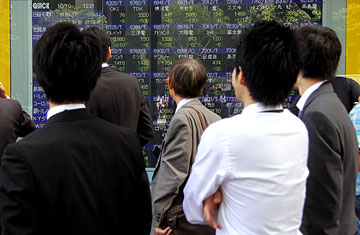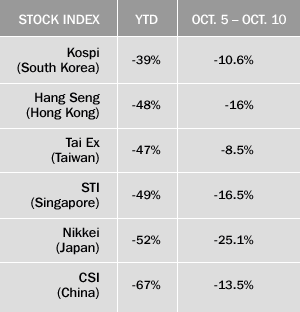
People look at an electronic stocks board in Tokyo on Oct. 10
Fear and despair returned to Asian stock markets on Friday as a drumbeat of bad economic news helped send share prices across the region plunging to historic losses.
The MSCI Asia Pacific Index was down 7.4%, adding to its largest one-week drop since 1987.
Japan was hit hardest: Tokyo's Nikkei index fell nearly 10%, capping a week that saw Japanese shares plummet 25%, the worst weekly performance in the index's history. Investors fled after the credit squeeze claimed its first Japanese victim: Yamato Life Insurance Co., which filed for bankruptcy Friday after suffering huge losses in its securities holdings. Yamato's collapse, the first by a Japanese insurance company since 2001, sparked fresh worries about the health of the country's financial institutions. "My concern is whether the banks and insurance companies can keep standing," says Yukiko Kanoh, 53, an administrative assistant in Yokohama.
Hong Kong's Hang Seng index continued its weeklong swoon, falling 7.19% after recovering slightly on Thursday. Korea's Kospi index fell 4.13%, while India's Sensex lost 7% of its value after plummeting in morning trading. China was not spared. The CSI 300 index, which tracks both the Shanghai and Shenzhen exchanges, was down 4.43%. Singapore's main index fell 7.72% amid economic news that the island state has slipped into recession for the first time since 2002. In a speech Friday, Singaporean Prime Minister Lee Hsien Loong predicted a continued "rough ride" for Asia. "The world is caught up in a financial storm, and dark clouds fill the immediate horizon," Lee said to a meeting of Indian expatriates in Singapore.
Alvin Liew, a Singapore-based economist for Standard Chartered Bank, says Singapore's bad economic news was exacerbated by investors' broadly pessimistic mood. "My feeling right now is that people take negative news more seriously than any positive news," he says.
 |
According to Liew, that's because the monetary-policy prescriptions offered by central banks have thus far done little to cure the constipated credit markets that are stalling the global economy. Under normal circumstances, interest-rate cuts by central banks would promote interbank lending. But Wednesday's coordinated rate cuts in the U.S., Europe and Asia have failed to restore lenders' confidence. The London Interbank Offered Rate, the benchmark for short-term interbank lending rates, actually rose to 4.75% Thursday, its highest level of the year. In Hong Kong, interbank lending rates have doubled in the past month. Banks remain gun-shy about resuming lending, in part because they remain unclear about the scope and details of a proposed U.S. bailout of its banking industry. "The level of trust between financial institutions is relatively low," says Tai Hui, head of Asia economic research for Standard Chartered. "That needs to be restored as soon as possible."
Banks may get some clarity soon. On Friday, finance ministers from the G-7 nations will meet in Washington, D.C., to discuss a coordinated response to the financial crisis. Adrian Mowat, chief Asia and emerging-market strategist for JPMorgan in Hong Kong, says that central bankers may follow Britain's lead by pumping liquidity into their banking sectors and underwriting loans between banks. "The situation is so serious that they will have to deal with it," Mowat says. "The collapse and crash this week means they must act now.
"It's a bit like a bad episode of House," Mowat continues. "The patient is really clearly ill. They'll try a couple of remedies that normally work, but they don't work. They maybe treat the symptoms but not the core problem. Normally, at the end of the show, the patient lives. I'm assuming this is going to end the same way."
For export-driven economies in Asia, there is little to do but wait and hope that the U.S. and Europe will find the right medicine. "We [in Asia] remain spectators in a sport in which spectators get hurt," Mowat wrote in a recent report.
Huang Chi-lin, a translator in Taipei, is certainly feeling the pain. "I'm very afraid for my savings and especially my daughter's future," Huang says. "I don't know if my money will keep its value. I invest, but now I don't know how to invest because everything is going down, so I keep watching and worrying about it." Other Asians are taking a philosophical view of the worsening crisis. Dorothy Wong, 49, a psychiatric counselor in Hong Kong, says that a global crash could change laissez-faire attitudes about money. "I think the world needed this, actually," says Wong. "My kids and my friends' kids are spoiled. We made lots and lots of money, and we gave them the impression that it's easy and assured. So this is all a good lesson."
— With reporting by Don Duncan / Hong Kong, Yuki Oda and Michiko Toyama / Tokyo, Natalie Tso / Taipei and Jennifer Veale / Seoul
